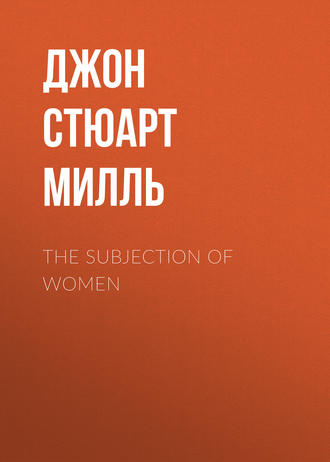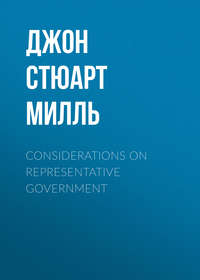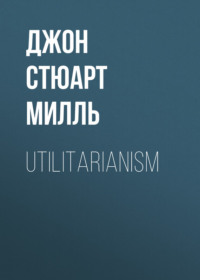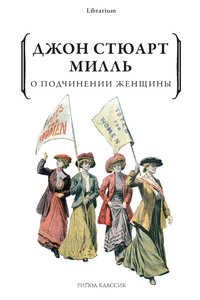 полная версия
полная версияThe Subjection of Women
Of all difficulties which impede the progress of thought, and the formation of well-grounded opinions on life and social arrangements, the greatest is now the unspeakable ignorance and inattention of mankind in respect to the influences which form human character. Whatever any portion of the human species now are, or seem to be, such, it is supposed, they have a natural tendency to be: even when the most elementary knowledge of the circumstances in which they have been placed, clearly points out the causes that made them what they are. Because a cottier deeply in arrears to his landlord is not industrious, there are people who think that the Irish are naturally idle. Because constitutions can be overthrown when the authorities appointed to execute them turn their arms against them, there are people who think the French incapable of free government. Because the Greeks cheated the Turks, and the Turks only plundered the Greeks, there are persons who think that the Turks are naturally more sincere: and because women, as is often said, care nothing about politics except their personalities, it is supposed that the general good is naturally less interesting to women than to men. History, which is now so much better understood than formerly, teaches another lesson: if only by showing the extraordinary susceptibility of human nature to external influences, and the extreme variableness of those of its manifestations which are supposed to be most universal and uniform. But in history, as in travelling, men usually see only what they already had in their own minds; and few learn much from history, who do not bring much with them to its study.
Hence, in regard to that most difficult question, what are the natural differences between the two sexes – a subject on which it is impossible in the present state of society to obtain complete and correct knowledge – while almost everybody dogmatizes upon it, almost all neglect and make light of the only means by which any partial insight can be obtained into it. This is, an analytic study of the most important department of psychology, the laws of the influence of circumstances on character. For, however great and apparently ineradicable the moral and intellectual differences between men and women might be, the evidence of their being natural differences could only be negative. Those only could be inferred to be natural which could not possibly be artificial – the residuum, after deducting every characteristic of either sex which can admit of being explained from education or external circumstances. The profoundest knowledge of the laws of the formation of character is indispensable to entitle any one to affirm even that there is any difference, much more what the difference is, between the two sexes considered as moral and rational beings; and since no one, as yet, has that knowledge, (for there is hardly any subject which, in proportion to its importance, has been so little studied), no one is thus far entitled to any positive opinion on the subject. Conjectures are all that can at present be made; conjectures more or less probable, according as more or less authorized by such knowledge as we yet have of the laws of psychology, as applied to the formation of character.
Even the preliminary knowledge, what the differences between the sexes now are, apart from all question as to how they are made what they are, is still in the crudest and most incomplete state. Medical practitioners and physiologists have ascertained, to some extent, the differences in bodily constitution; and this is an important element to the psychologist: but hardly any medical practitioner is a psychologist. Respecting the mental characteristics of women; their observations are of no more worth than those of common men. It is a subject on which nothing final can be known, so long as those who alone can really know it, women themselves, have given but little testimony, and that little, mostly suborned. It is easy to know stupid women. Stupidity is much the same all the world over. A stupid person's notions and feelings may confidently be inferred from those which prevail in the circle by which the person is surrounded. Not so with those whose opinions and feelings are an emanation from their own nature and faculties. It is only a man here and there who has any tolerable knowledge of the character even of the women of his own family. I do not mean, of their capabilities; these nobody knows, not even themselves, because most of them have never been called out. I mean their actually existing thoughts and feelings. Many a man thinks he perfectly understands women, because he has had amatory relations with several, perhaps with many of them. If he is a good observer, and his experience extends to quality as well as quantity, he may have learnt something of one narrow department of their nature – an important department, no doubt. But of all the rest of it, few persons are generally more ignorant, because there are few from whom it is so carefully hidden. The most favourable case which a man can generally have for studying the character of a woman, is that of his own wife: for the opportunities are greater, and the cases of complete sympathy not so unspeakably rare. And in fact, this is the source from which any knowledge worth having on the subject has, I believe, generally come. But most men have not had the opportunity of studying in this way more than a single case: accordingly one can, to an almost laughable degree, infer what a man's wife is like, from his opinions about women in general. To make even this one case yield any result, the woman must be worth knowing, and the man not only a competent judge, but of a character so sympathetic in itself, and so well adapted to hers, that he can either read her mind by sympathetic intuition, or has nothing in himself which makes her shy of disclosing it. Hardly anything, I believe, can be more rare than this conjunction. It often happens that there is the most complete unity of feeling and community of interests as to all external things, yet the one has as little admission into the internal life of the other as if they were common acquaintance. Even with true affection, authority on the one side and subordination on the other prevent perfect confidence. Though nothing may be intentionally withheld, much is not shown. In the analogous relation of parent and child, the corresponding phenomenon must have been in the observation of every one. As between father and son, how many are the cases in which the father, in spite of real affection on both sides, obviously to all the world does not know, nor suspect, parts of the son's character familiar to his companions and equals. The truth is, that the position of looking up to another is extremely unpropitious to complete sincerity and openness with him. The fear of losing ground in his opinion or in his feelings is so strong, that even in an upright character, there is an unconscious tendency to show only the best side, or the side which, though not the best, is that which he most likes to see: and it may be confidently said that thorough knowledge of one another hardly ever exists, but between persons who, besides being intimates, are equals. How much more true, then, must all this be, when the one is not only under the authority of the other, but has it inculcated on her as a duty to reckon everything else subordinate to his comfort and pleasure, and to let him neither see nor feel anything coming from her, except what is agreeable to him. All these difficulties stand in the way of a man's obtaining any thorough knowledge even of the one woman whom alone, in general, he has sufficient opportunity of studying. When we further consider that to understand one woman is not necessarily to understand any other woman; that even if he could study many women of one rank, or of one country, he would not thereby understand women of other ranks or countries; and even if he did, they are still only the women of a single period of history; we may safely assert that the knowledge which men can acquire of women, even as they have been and are, without reference to what they might be, is wretchedly imperfect and superficial, and always will be so, until women themselves have told all that they have to tell.
And this time has not come; nor will it come otherwise than gradually. It is but of yesterday that women have either been qualified by literary accomplishments, or permitted by society, to tell anything to the general public. As yet very few of them dare tell anything, which men, on whom their literary success depends, are unwilling to hear. Let us remember in what manner, up to a very recent time, the expression, even by a male author, of uncustomary opinions, or what are deemed eccentric feelings, usually was, and in some degree still is, received; and we may form some faint conception under what impediments a woman, who is brought up to think custom and opinion her sovereign rule, attempts to express in books anything drawn from the depths of her own nature. The greatest woman who has left writings behind her sufficient to give her an eminent rank in the literature of her country, thought it necessary to prefix as a motto to her boldest work, “Un homme peut braver l'opinion; une femme doit s'y soumettre.”1 The greater part of what women write about women is mere sycophancy to men. In the case of unmarried women, much of it seems only intended to increase their chance of a husband. Many, both married and unmarried, overstep the mark, and inculcate a servility beyond what is desired or relished by any man, except the very vulgarest. But this is not so often the case as, even at a quite late period, it still was. Literary women are becoming more freespoken, and more willing to express their real sentiments. Unfortunately, in this country especially, they are themselves such artificial products, that their sentiments are compounded of a small element of individual observation and consciousness, and a very large one of acquired associations. This will be less and less the case, but it will remain true to a great extent, as long as social institutions do not admit the same free development of originality in women which is possible to men. When that time comes, and not before, we shall see, and not merely hear, as much as it is necessary to know of the nature of women, and the adaptation of other things to it.
I have dwelt so much on the difficulties which at present obstruct any real knowledge by men of the true nature of women, because in this as in so many other things “opinio copiæ inter maximas causas inopiæ est;” and there is little chance of reasonable thinking on the matter, while people flatter themselves that they perfectly understand a subject of which most men know absolutely nothing, and of which it is at present impossible that any man, or all men taken together, should have knowledge which can qualify them to lay down the law to women as to what is, or is not, their vocation. Happily, no such knowledge is necessary for any practical purpose connected with the position of women in relation to society and life. For, according to all the principles involved in modern society, the question rests with women themselves – to be decided by their own experience, and by the use of their own faculties. There are no means of finding what either one person or many can do, but by trying – and no means by which any one else can discover for them what it is for their happiness to do or leave undone.
One thing we may be certain of – that what is contrary to women's nature to do, they never will be made to do by simply giving their nature free play. The anxiety of mankind to interfere in behalf of nature, for fear lest nature should not succeed in effecting its purpose, is an altogether unnecessary solicitude. What women by nature cannot do, it is quite superfluous to forbid them from doing. What they can do, but not so well as the men who are their competitors, competition suffices to exclude them from; since nobody asks for protective duties and bounties in favour of women; it is only asked that the present bounties and protective duties in favour of men should be recalled. If women have a greater natural inclination for some things than for others, there is no need of laws or social inculcation to make the majority of them do the former in preference to the latter. Whatever women's services are most wanted for, the free play of competition will hold out the strongest inducements to them to undertake. And, as the words imply, they are most wanted for the things for which they are most fit; by the apportionment of which to them, the collective faculties of the two sexes can be applied on the whole with the greatest sum of valuable result.
The general opinion of men is supposed to be, that the natural vocation of a woman is that of a wife and mother. I say, is supposed to be, because, judging from acts – from the whole of the present constitution of society – one might infer that their opinion was the direct contrary. They might be supposed to think that the alleged natural vocation of women was of all things the most repugnant to their nature; insomuch that if they are free to do anything else – if any other means of living, or occupation of their time and faculties, is open, which has any chance of appearing desirable to them – there will not be enough of them who will be willing to accept the condition said to be natural to them. If this is the real opinion of men in general, it would be well that it should be spoken out. I should like to hear somebody openly enunciating the doctrine (it is already implied in much that is written on the subject) – “It is necessary to society that women should marry and produce children. They will not do so unless they are compelled. Therefore it is necessary to compel them.” The merits of the case would then be clearly defined. It would be exactly that of the slaveholders of South Carolina and Louisiana. “It is necessary that cotton and sugar should be grown. White men cannot produce them. Negroes will not, for any wages which we choose to give. Ergo they must be compelled.” An illustration still closer to the point is that of impressment. Sailors must absolutely be had to defend the country. It often happens that they will not voluntarily enlist. Therefore there must be the power of forcing them. How often has this logic been used! and, but for one flaw in it, without doubt it would have been successful up to this day. But it is open to the retort – First pay the sailors the honest value of their labour. When you have made it as well worth their while to serve you, as to work for other employers, you will have no more difficulty than others have in obtaining their services. To this there is no logical answer except “I will not:” and as people are now not only ashamed, but are not desirous, to rob the labourer of his hire, impressment is no longer advocated. Those who attempt to force women into marriage by closing all other doors against them, lay themselves open to a similar retort. If they mean what they say, their opinion must evidently be, that men do not render the married condition so desirable to women, as to induce them to accept it for its own recommendations. It is not a sign of one's thinking the boon one offers very attractive, when one allows only Hobson's choice, “that or none.” And here, I believe, is the clue to the feelings of those men, who have a real antipathy to the equal freedom of women. I believe they are afraid, not lest women should be unwilling to marry, for I do not think that any one in reality has that apprehension; but lest they should insist that marriage should be on equal conditions; lest all women of spirit and capacity should prefer doing almost anything else, not in their own eyes degrading, rather than marry, when marrying is giving themselves a master, and a master too of all their earthly possessions. And truly, if this consequence were necessarily incident to marriage, I think that the apprehension would be very well founded. I agree in thinking it probable that few women, capable of anything else, would, unless under an irresistible entrainement, rendering them for the time insensible to anything but itself, choose such a lot, when any other means were open to them of filling a conventionally honourable place in life: and if men are determined that the law of marriage shall be a law of despotism, they are quite right, in point of mere policy, in leaving to women only Hobson's choice. But, in that case, all that has been done in the modern world to relax the chain on the minds of women, has been a mistake. They never should have been allowed to receive a literary education. Women who read, much more women who write, are, in the existing constitution of things, a contradiction and a disturbing element: and it was wrong to bring women up with any acquirements but those of an odalisque, or of a domestic servant.
CHAPTER II
It will be well to commence the detailed discussion of the subject by the particular branch of it to which the course of our observations has led us: the conditions which the laws of this and all other countries annex to the marriage contract. Marriage being the destination appointed by society for women, the prospect they are brought up to, and the object which it is intended should be sought by all of them, except those who are too little attractive to be chosen by any man as his companion; one might have supposed that everything would have been done to make this condition as eligible to them as possible, that they might have no cause to regret being denied the option of any other. Society, however, both in this, and, at first, in all other cases, has preferred to attain its object by foul rather than fair means: but this is the only case in which it has substantially persisted in them even to the present day. Originally women were taken by force, or regularly sold by their father to the husband. Until a late period in European history, the father had the power to dispose of his daughter in marriage at his own will and pleasure, without any regard to hers. The Church, indeed, was so far faithful to a better morality as to require a formal “yes” from the woman at the marriage ceremony; but there was nothing to shew that the consent was other than compulsory; and it was practically impossible for the girl to refuse compliance if the father persevered, except perhaps when she might obtain the protection of religion by a determined resolution to take monastic vows. After marriage, the man had anciently (but this was anterior to Christianity) the power of life and death over his wife. She could invoke no law against him; he was her sole tribunal and law. For a long time he could repudiate her, but she had no corresponding power in regard to him. By the old laws of England, the husband was called the lord of the wife; he was literally regarded as her sovereign, inasmuch that the murder of a man by his wife was called treason (petty as distinguished from high treason), and was more cruelly avenged than was usually the case with high treason, for the penalty was burning to death. Because these various enormities have fallen into disuse (for most of them were never formally abolished, or not until they had long ceased to be practised) men suppose that all is now as it should be in regard to the marriage contract; and we are continually told that civilization and Christianity have restored to the woman her just rights. Meanwhile the wife is the actual bond-servant of her husband: no less so, as far as legal obligation goes, than slaves commonly so called. She vows a lifelong obedience to him at the altar, and is held to it all through her life by law. Casuists may say that the obligation of obedience stops short of participation in crime, but it certainly extends to everything else. She can do no act whatever but by his permission, at least tacit. She can acquire no property but for him; the instant it becomes hers, even if by inheritance, it becomes ipso facto his. In this respect the wife's position under the common law of England is worse than that of slaves in the laws of many countries: by the Roman law, for example, a slave might have his peculium, which to a certain extent the law guaranteed to him for his exclusive use. The higher classes in this country have given an analogous advantage to their women, through special contracts setting aside the law, by conditions of pin-money, &c.: since parental feeling being stronger with fathers than the class feeling of their own sex, a father generally prefers his own daughter to a son-in-law who is a stranger to him. By means of settlements, the rich usually contrive to withdraw the whole or part of the inherited property of the wife from the absolute control of the husband: but they do not succeed in keeping it under her own control; the utmost they can do only prevents the husband from squandering it, at the same time debarring the rightful owner from its use. The property itself is out of the reach of both; and as to the income derived from it, the form of settlement most favourable to the wife (that called “to her separate use”) only precludes the husband from receiving it instead of her: it must pass through her hands, but if he takes it from her by personal violence as soon as she receives it, he can neither be punished, nor compelled to restitution. This is the amount of the protection which, under the laws of this country, the most powerful nobleman can give to his own daughter as respects her husband. In the immense majority of cases there is no settlement: and the absorption of all rights, all property, as well as all freedom of action, is complete. The two are called “one person in law,” for the purpose of inferring that whatever is hers is his, but the parallel inference is never drawn that whatever is his is hers; the maxim is not applied against the man, except to make him responsible to third parties for her acts, as a master is for the acts of his slaves or of his cattle. I am far from pretending that wives are in general no better treated than slaves; but no slave is a slave to the same lengths, and in so full a sense of the word, as a wife is. Hardly any slave, except one immediately attached to the master's person, is a slave at all hours and all minutes; in general he has, like a soldier, his fixed task, and when it is done, or when he is off duty, he disposes, within certain limits, of his own time, and has a family life into which the master rarely intrudes. “Uncle Tom” under his first master had his own life in his “cabin,” almost as much as any man whose work takes him away from home, is able to have in his own family. But it cannot be so with the wife. Above all, a female slave has (in Christian countries) an admitted right, and is considered under a moral obligation, to refuse to her master the last familiarity. Not so the wife: however brutal a tyrant she may unfortunately be chained to – though she may know that he hates her, though it may be his daily pleasure to torture her, and though she may feel it impossible not to loathe him – he can claim from her and enforce the lowest degradation of a human being, that of being made the instrument of an animal function contrary to her inclinations. While she is held in this worst description of slavery as to her own person, what is her position in regard to the children in whom she and her master have a joint interest? They are by law his children. He alone has any legal rights over them. Not one act can she do towards or in relation to them, except by delegation from him. Even after he is dead she is not their legal guardian, unless he by will has made her so. He could even send them away from her, and deprive her of the means of seeing or corresponding with them, until this power was in some degree restricted by Serjeant Talfourd's Act. This is her legal state. And from this state she has no means of withdrawing herself. If she leaves her husband, she can take nothing with her, neither her children nor anything which is rightfully her own. If he chooses, he can compel her to return, by law, or by physical force; or he may content himself with seizing for his own use anything which she may earn, or which may be given to her by her relations. It is only legal separation by a decree of a court of justice, which entitles her to live apart, without being forced back into the custody of an exasperated jailer – or which empowers her to apply any earnings to her own use, without fear that a man whom perhaps she has not seen for twenty years will pounce upon her some day and carry all off. This legal separation, until lately, the courts of justice would only give at an expense which made it inaccessible to any one out of the higher ranks. Even now it is only given in cases of desertion, or of the extreme of cruelty; and yet complaints are made every day that it is granted too easily. Surely, if a woman is denied any lot in life but that of being the personal body-servant of a despot, and is dependent for everything upon the chance of finding one who may be disposed to make a favourite of her instead of merely a drudge, it is a very cruel aggravation of her fate that she should be allowed to try this chance only once. The natural sequel and corollary from this state of things would be, that since her all in life depends upon obtaining a good master, she should be allowed to change again and again until she finds one. I am not saying that she ought to be allowed this privilege. That is a totally different consideration. The question of divorce, in the sense involving liberty of remarriage, is one into which it is foreign to my purpose to enter. All I now say is, that to those to whom nothing but servitude is allowed, the free choice of servitude is the only, though a most insufficient, alleviation. Its refusal completes the assimilation of the wife to the slave – and the slave under not the mildest form of slavery: for in some slave codes the slave could, under certain circumstances of ill usage, legally compel the master to sell him. But no amount of ill usage, without adultery superadded, will in England free a wife from her tormentor.









